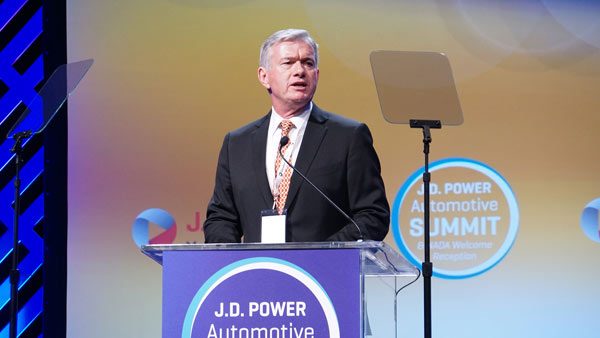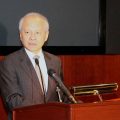
Prospective car-buyers typically check out hundreds of reviews before making up their mind. Finbarr O’Neill, CEO and president of J.D.Power, wishes to streamline things for them.
O’Neill leads a data analytics firm that works with all tiers of auto brands that you can probably think of. It aims to provide customers independent and unbiased ratings on cars.
J.D. Power’s solid research on car performance, design and dependability is sought after by mainstream media outlets, and is fast becoming consumers’ trusted, if not the only, source of credible, reliable information that could help decide which vehicle to buy.
O’Neill, who started out three decades ago as a legal counsel at Toyota Motors Sales in the United States, understands the power of perception in shaping customer preferences.
“My introduction to the automotive industry was through addressing a challenge of a brand image. So I learned quickly that the most important thing was the voice of the customers because that determines the future, whether it’s autonomous vehicles or new energy vehicles,” he said.
Once a subsidiary of McGraw Hill Financial, also the parent of Standard & Poor’s ratings agency, J.D. Power was taken private last September by private equity firm XIO Group, giving it more flexibility and resources to focus on its core tasks of data analytics and customer research.
O’Neill sees the spinoff as a window of opportunity to turn the business-to-business company into a customer-aware brand. As part of a revamp plan, he transformed the firm from an old-fashioned, mailing service provider to an outfit that reaches consumers through digital means like social media.
“Because the consumers are living in a more mobile-connected world, it’s important for us to reach them in a variety of ways. Consumer behavior is changing; we need to go where the consumers go,” he said.
From the very latest industry analytics and rankings to study highlights via social media and in-person roundtables and conferences, O’Neill steers the wheel of a company that captures the opinions and perceptions of millions of customers from across the globe.
The divergence in consumer attitudes as exemplified in many of J.D. Power’s studies provides insights to automakers, which the latter use to finetune their strategies and products for success in the market.
For instance, according to the firm’s China Initial Quality Study published last year, unpleasant interior odors have topped the list of complaints by Chinese emerging motoring class, while that very leathery and sweet smell is something that their American counterparts crave in new cars.
In 2009, China raced past the US for the first time to become the world’s largest auto market, thanks to government incentives. The larger plan was to counter the global economic slowdown.
The past decade has witnessed changes not just in the size of cars but in their quality, said O’Neill, recalling his first trip to the Beijing Auto Show in 2008.
“Back then, you figured a clear difference between domestic vehicles and those of the joint ventures, from the metals and plastics they used. Now, all of these have gone away-there had been a rapid improvement in manufacturing capability,” he said.
That, according to O’Neill, has given much weight to Chinese preferences, which are in some cases becoming global standards.
For instance, China’s luxury sedan market has some peculiarities of its own, like the preference for more legroom and spacious backseats. The world’s leading OEMs (original equipment manufacturers) are customizing new models to suit local tastes.
Also, the increasingly sophisticated Chinese motorists have set high standards for connectivity in automobiles. The surge in smartphone usage is turning the country into the biggest telematics market on the planet, with companies looking to get a piece of the riches on offer.
That has called for more pressing needs for professional services like those offered by J.D. Power, especially as more new energy vehicles hit the road and their sales appear poised to pick up as the market matures.
While the initial customer concern would be anxiety over running out of gas in the middle of nowhere, what comes next is a question of price, in the absence of government subsidy, he said.
“But I see China as a leader in this area. The scale in China will drive innovation around battery technologies here in China. In the next decade, the cost of battery will come down, making electric vehicles relatively easy to produce,” he said.
China currently contributes to 15 percent of the company’s global revenue. O’Neill is optimistic the figure will grow as the firm expands beyond traditional auto services into retail banking and insurance.
“China is perhaps the most connected country in the world. We’ll be able to look at that trend and try to understand potential opportunities by watching how Chinese consumers change behavior over time,” he said.
More opportunities lie ahead as Chinese automakers are set to become global players vying for a market share overseas, he said.
“The perception of brand is important so we can work with Chinese companies to understand not only how one establishes a network overseas, but how one designs a car to succeed in the market. You only get a chance to launch once and you create a perception,” he said.


